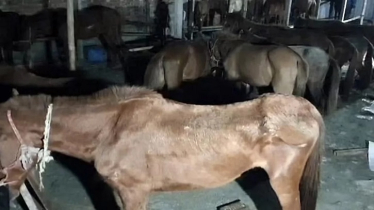
Taking advantage of the post-July uprising instability, wildlife smugglers have intensified their operations, targeting rare and endangered species in Bangladesh. Investigations by the Criminal Investigation Department (CID) have uncovered a sophisticated network that uses social media to lure buyers, set prices, and then steal animals from protected sites to deliver to local and international clients.
The investigation began following the theft of three ring-tailed lemurs from the Gazipur Safari Park earlier this year. The lemurs, a protected species native to Madagascar, were among 86 pairs of exotic animals imported to Bangladesh in 2018 by two private organizations, despite strict restrictions on their trade and sale. The animals were later placed in Gazipur Safari Park, where two lemur cubs were born, bringing the total population to four before one died.
On the night of March 23, unidentified perpetrators cut through the park’s security fence and stole two male and one female ring-tailed lemurs. CID’s inquiry revealed that Nipol Mahmud, an outsourced park worker, was directly involved in the theft. Mahmud allegedly photographed and filmed various rare and endangered animals inside the park and shared the content on private groups and pages on Facebook and other social media platforms to attract local and foreign buyers.
Once a buyer selected an animal and the price was settled, Mahmud would steal the specific animal from the park. CID discovered that on March 23, he cut through the enclosure, stole the three lemurs, and hid them at the home of a neighbor named Md. Jewel Mia. He later sold one lemur to Delwar Hossain Tawsif and Md. Sabbir Hossain Tapon for Tk 520,000. The remaining two were arranged to be sold to Indian buyers for Tk 700,000, with Tawsif and Tapon acting as intermediaries. The lemurs were delivered in cartons from Bhaluka in Mymensingh to the buyers’ vehicle, and Mahmud received Tk 70,000 as commission.
CID Special Superintendent of Police Jashim Uddin confirmed that Mahmud was part of an international wildlife trafficking ring. “As a park worker, he had easy access to rare species, enabling him to collect media and market them abroad. Once deals were finalized, he would steal the animals and hand them over to the traffickers,” he said. Six members of the ring, including Mahmud, have confessed before the court. Of the three stolen lemurs, one has been recovered, while efforts continue to rescue the remaining two.
According to the Wildlife Crime Control Unit, 4,044 wild animals have been rescued across the country between January and September this year. The breakdown includes 458 in January, 1,044 in February, 121 in March, 143 in April, 277 in May, 167 in June, 978 in July, 856 in August, and 2,111 in September. The rescued animals include various species of turtles, civets, birds, snakes, monkeys, tokay geckos, lemurs, elephants, bears, and langurs. Most smuggled animals are initially transported to neighboring countries before being sold at high prices in markets across China, Cambodia, and Vietnam.
The trafficking networks also deal in animal parts such as turtle shells, shark fat, and other body components, which are sold to international syndicates. In recent years, Bangladesh has also seen cases of unusual species trafficking, including the recovery of a nilgai from the Thakurgaon border in November last year and reports of kangaroos seized in Jalpaiguri, India, allegedly trafficked through Bangladesh.
Wildlife routes often include border areas such as Baliadangi, Hili, Shibganj, Burimari, and Meherpur, from where animals and their parts are smuggled through India’s “Chicken Neck” corridor to Myanmar, Cambodia, Vietnam, China, Thailand, and Gulf countries.
CID officials warned that without tighter border surveillance and stronger enforcement, Bangladesh risks becoming a major transit hub for global wildlife trafficking, threatening the country’s already fragile biodiversity.





